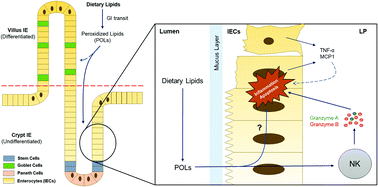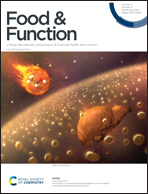The dietary peroxidized lipid, 13-HPODE, promotes intestinal inflammation by mediating granzyme B secretion from natural killer cells†
Abstract
It is well known that consumption of a high-fat diet (HFD) promotes intestinal inflammation despite little being known about causative factors. Recent evidence implicates dietary peroxidized lipids (POLs), which are typically formed from the oxidation of polyunsaturated fatty acid double bonds, as potential contributors due to their enrichment in HFDs, ability to be formed during gastrointestinal transit, and immunogenic and cytotoxic properties. 13-HPODE, the most common dietary POL, demonstrates pro-inflammatory activity in a variety of immune cells, especially Natural Killer (NK) cells whose role in mediating intestinal inflammation remains unclear. Therefore, we set out to investigate how 13-HPODE and other POLs modulate NK-cell activity in the context of intestinal inflammation. We not only found that NK cells fully decompose exogenous 13-HPODE, but that direct treatment stimulates TNF-α and MCP1 expression as well as Granzyme B (GZMB) secretion in a dose-dependent manner. Similar results were observed upon incubation of NK cells with oxidized, but not-unoxidized, low-density lipoproteins. Secretory products from 13-HPODE-treated NK cells were able to induce Caco2 intestinal cell inflammation in the same way as exogenous GZMB with greater sensitivity in undifferentiated compared to differentiated cells. Results were recapitulated in 13-HPODE-fed mice, demonstrating both spatial and temporal patterns of elevated GZMB expression that favored acute treatments in the distal intestinal epithelium. Collectively, our results suggest that that HFD-derived POLs, like 13-HPODE, potentially contribute to intestinal inflammation by stimulating the secretion of pro-inflammatory granzymes by resident NK cells, ultimately revealing a more direct role for diet in modulating gut homeostasis and the immune environment.

- This article is part of the themed collection: Food & Function Recent HOT articles


 Please wait while we load your content...
Please wait while we load your content...